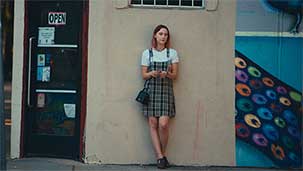We can’t help where we were born. Like our gender, race, socio-economic status, or generation, it’s one of the fundamental truths over which we have absolutely no control. Many of us, myself included, couldn’t wait to leave the place we grew up and start exploring the world. It often isn’t until years later (and usually with some physical distance) that we begin to feel a begrudging respect for the community we came from, a kind of affection for the places and people that unknowingly shaped us.
I’m not sure where you grew up, but I imagine if you were tasked with scouting locations for Lady Bird that you have more than just a passing knowledge of Sacramento, California. This is the type of coming-of-age story that could have been set anywhere, and yet had to be set there. It is universal while remaining weirdly specific to its writer/director Greta Gerwig who, in her first time out of the gate, establishes herself as a confident and intuitive 21st century American filmmaker.
Lady Bird opens on a Joan Didion quote about Sacramento, which frankly, worried me. Not the quote itself, but the choice to open on a Didion quote. Anything that comes after must know exactly what it is or risk appearing precious at best, or pompous at worst. The particular quote deflates the assumption that California is a bastion of hedonism and excitement when in reality, Sacramento, as a place, proves quite the opposite. The quote perfectly sets the unselfconsciously comic tone for the entire film. So much so that using Didion quotes to open movies should be retired after Lady Bird.
Sacramento, a place full of southwest suburban blandness and mundane beauty, is where the not-so-titular Lady Bird lives, and longs to escape. We meet Christine (AKA Lady Bird) at the beginning of her senior year of high school in 2002, a year that feels recent, and though somehow – without smartphones or social media dependences, and under the backdrop of the nascent War on Terror – feels like a lifetime ago. Christine’s personality is too big for Sacramento, and possibly too big for her own house. Like most teenagers, she is the center of her own universe, much to the chagrin of her strong-willed mother, Marion. The heart of the film beats on the precariousness of their relationship.
Much like last year’s coming-of-age-period-piece 20thCentury Women (which also starred Gerwig), the parental figures are given as much depth and nuance as the central, teen characters. And like that film, Lady Bird lives and dies on its performances. Saoirse Ronan, perhaps the most naturally, unaffected actor of her generation, is equal turns endearing and enraging, and understands instinctively that any move too far to either end of that spectrum would make her character insufferable. Laurie Metcalfe, consistently singular in any role, is heartbreaking as Marion, who, like most mothers of teen daughters, is damned if she does and damned if she doesn’t give her absolute all to her child. Keeping the two from emotional annihilation is the always underrated Tracy Letts, as the patriarch of the family caught between two forces of nature.
One particular scenario involves Christine self-defensively joking about living on the wrong side of the tracks from Sacramento’s “Fabulous 40s ”, a well-to-do neighbourhood made up of elegant, picturesque homes. It’s a joke that, like much of Christine’s self-serving behaviour and flippant remarks, cuts Marion to the core. It’s these types of seemingly insignificant comments and actions – particularly between family members - that fester and become slow-burning resentments that eventually explode, leaving everyone burned.
Gerwig understands the intense drama in these tiny moments, and lets them build organically. These are the moments that inform entire relationships, dictating their future, and influencing how we remember the past. Moments that take place on a country road, a cramped kitchen, or a thrift store change room - places that seem meaningless or banal at the time yet somehow shape who we will become.
As you drove around Sacramento, finding these particular places, perhaps you didn’t realize their import at the time. No one knows when they’re making a movie whether it’s going to work or not. The same can be said for building a life – one is rarely presently conscious of how certain circumstances will affect the outcome of their future. It’s often only later when we realize that where we’re from has a direct influence on where we’re going, for better or for worse. In this case, for the better.
Regards,
Di







